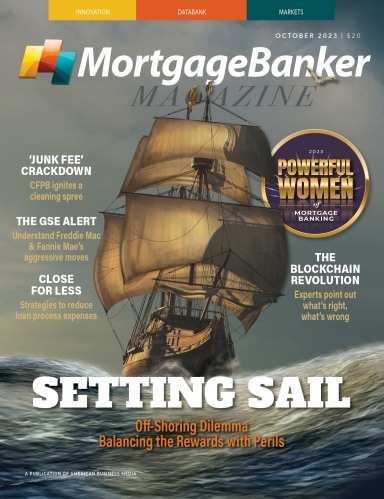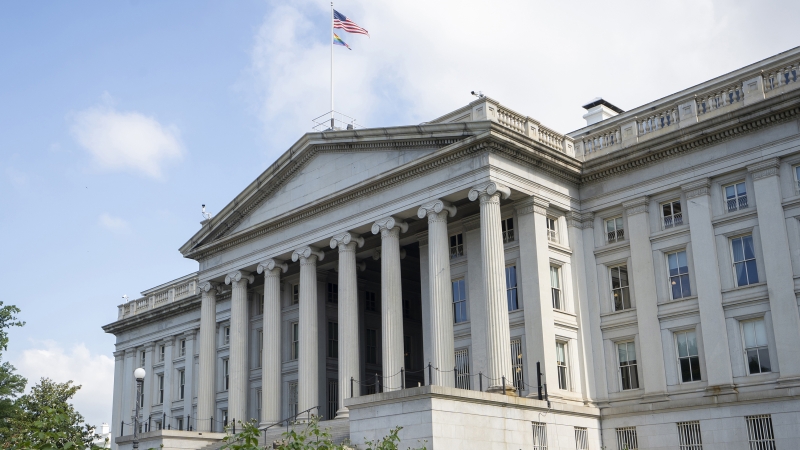Regulatory Hurdles
The fact that there is no centralized hub for blockchain is perhaps its most valuable asset as well as the highest hurdle to wider use by mortgage industry professionals.
“When you go to a bank, you see this big building with pillars in front of it. And presumably the money would be there because it’s a trusted institution. There were regulators who made sure it acted in a safe and sound manner,” Roos says. “The idea with this distributed-ledger system is that there is no central authority to whom you can look if something goes wrong. I think for reasons of lack of transparency, lack of accountability … there’s going to be a reluctance to use blockchain widely or immediately in a lot of different applications. I may be proven wrong, but that’s my suspicion.”
Insurance and mortgage are highly regulated industries. The Truth in Lending Act (TILA) and the Real Estate Settlement Procedures Act (RESPA), known together as TRID, is a series of rules enforced by the Consumer Financial Protection Bureau (CFPB). Lots of time, money and resources were invested by financial companies to ensure compliance and good business practices with the passage of these and other laws.
“If a mortgage company decided they want to create their own blockchain and operate their origination or servicing system using blockchain, I think they would get a quick visit from their regulator, be it the Department of Banking or some other regulatory agency,” Roos points out.
Most people don’t know the inner workings of the car they drive, but trust its basic safety after obtaining insurance and registration, and have some idea of where to go if it needs repairing.
“Who’s gonna perform that role for blockchain? It takes care of itself, right?” says Roos. “I’m very interested to see if it can be applied in a broader manner, but I’m not confident that will happen anytime soon.”
The Way It’s Always Been
As a regulatory lawyer in financial services for most of his career, Roos has watched tech evolve and knows industry changes are inevitable.
“I just don’t know that blockchain, which is one technological tool essentially, is going to be driving that change,” he says. “I think technology can be very helpful to streamline the processes, cut costs, and provide better services. But I think we just have to be careful about it. There are some limitations of blockchain and it’s a little opaque to most people.”
As long as public records were kept, real estate transactions, property transfers and deeds have been recorded in local government offices, with times stamped and fees paid. Homeowners owe taxes to the county or municipality in which they reside, after all.
Thousands of these recording offices exist across the U.S. and each has its own processes and practices. However, even as technology progresses, the manner in which a homeowner registers their property has not changed.
“In this day and age, they still continue to do things the way they did it many years ago,” Roos says. “And everybody likes to do it their own way.”
Instituting a single recording office for say - the entire U.S - might eventually prove more efficient, but it would also be quite an undertaking.
With that said, energy efficiency is one of the world’s top priorities right now and the blockchain mining process demands high energy consumption. Bitcoin alone is estimated to consume 127 terawatt-hours (TWh) per year, which is more energy, electricity and heat than many countries.
While technological advancements continue to deliver new solutions to the mortgage industry, will blockchain be a gamechanger?
“I don’t consider it up there with the invention of fire or the wheel,” Roos says.
Equilibrium Mortgage Solutions founder Paul Campbell has higher expectations.
“Blockchain represents the ability to omit specific pieces of data and still have a grasp on the entire flow of a loan,” says Campbell, who is also executive vice president of lending at Kwik Mortgage. “It gives individuals the ability to work on separate pieces and then holistically allows the system to put it all together, which I think in the long run is going to create efficiencies and reduce fraud, identity theft and things of that nature. I see blockchain as it continues to mature, to be a tremendous tool to the financial services industry and that includes home mortgage.”
The Studies
Only one-quarter of lenders surveyed in 2022 by Fannie Mae told the enterprise they were familiar with blockchain technology and its possible applications in the mortgage business. Of the 20% of lenders that said they have looked into blockchain, 41% plan to adopt it within four years. Although familiarity with blockchain still seems low among industry professionals, about 40% of study respondents said they believe decentralized finance - what defines blockchain - has high to very high potential to disrupt incumbent financial institutions.
Whether or not blockchain will cause a small rift in the mortgage industry or a collision equivalent to the impact of a large asteroid appears to be up to lawmakers and regulators.
Congress is now working to expand its crypto industry oversight by defining the jurisdiction of the Commodity Futures Trading Commission and Securities and Exchange Commission.
The SEC has stated that most cryptocurrencies are securities and subject to investor protection rules, a claim disputed by most crypto companies.












